
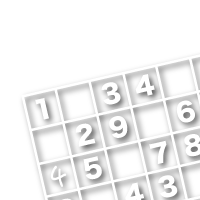
Sponsored Links
TOP > Techniques > BUG+1
Solving Techniques 12
BUG+1
(Binary Universal Grave + 1)
BUG situation
Please look at the diagram below. [12][12] are in rows B and D.

If [1] is in [R2C1], the result is as follows.
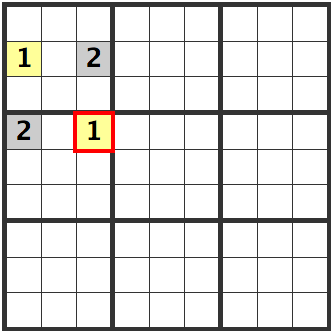
If [2] is in [R2C2], the result is as follows.
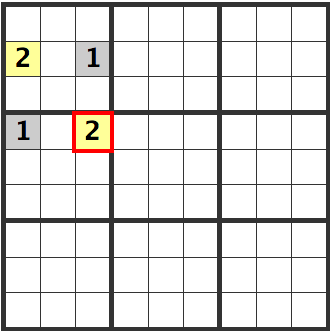
In this strong link, two results can happen and both could work as the solution.
This means that there are two possible solutions to the puzzle. A Sudoku problem can’t have two solutions. This is what is known as the BUG state.
BUG+1
Below, there is the BUG from above, however, with one cell with three candidates [123]. (It is a plus one to the BUG state and hence is called BUG+1) If [1] or [2] goes into these cells, it will be in the unsolvable state like before, so in this case a [3] is entered here.
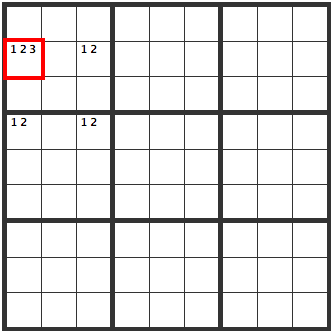
In this way, if there is a candidate that can get you out of a BUG state, using that number instead of the others, is called the BUG+1 technique.
There are more complex versions of the BUG state. Whenever there are the same two numbers to choose that, form a strong link, it is a BUG state.
Sponsored Links
More elaborate BUGs
When looking up BUGs, a crazy sample was found posted in the comment section by someone on http://www.sudokuwiki.org/BUG, so we examined it.

If the red cell is a [1]
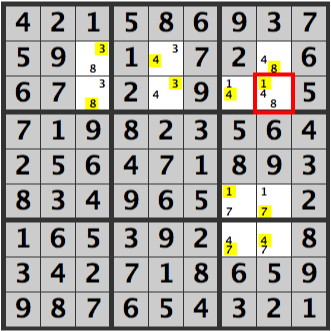
If the red cell is a [4]
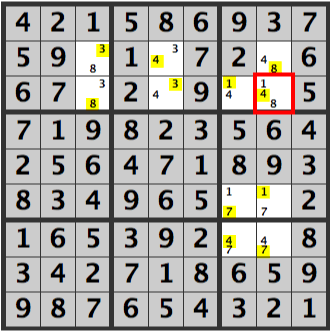
If the red cell is an [8]
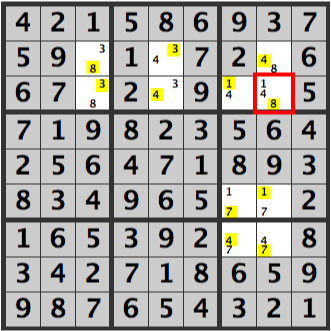
Astonishingly, in each situation the solution works. It’s amazing what some people find!
Strong link
As shown below, a link where only two numbers are possible in a row, column or box, is called a strong link. In the diagram, it is between [1] and [2].
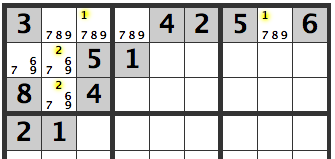
Names of cells in Sudoku
| R1C1 | R1C2 | R1C3 | R1C4 | R1C5 | R1C6 | R1C7 | R1C8 | R1C9 |
| R2C1 | R2C2 | R2C3 | R2C4 | R2C5 | R2C6 | R2C7 | R2C8 | R2C9 |
| R3C1 | R3C2 | R3C3 | R3C4 | R3C5 | R3C6 | R3C7 | R3C8 | R3C9 |
| R4C1 | R4C2 | R4C3 | R4C4 | R4C5 | R4C6 | R4C7 | R4C8 | R4C9 |
| R5C1 | R5C2 | R5C3 | R5C4 | R5C5 | R5C6 | R5C7 | R5C8 | R5C9 |
| R6C1 | R6C2 | R6C3 | R6C4 | R6C5 | R6C6 | R6C7 | R6C8 | R6C9 |
| R7C1 | R7C2 | R7C3 | R7C4 | R7C5 | R7C6 | R7C7 | R7C8 | R7C9 |
| R8C1 | R8C2 | R8C3 | R8C4 | R8C5 | R8C6 | R8C7 | R8C8 | R8C9 |
| R9C1 | R9C2 | R9C3 | R9C4 | R9C5 | R9C6 | R9C7 | R9C8 | R9C9 |
Sponsored Links

